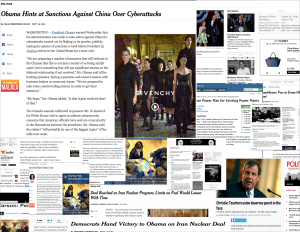Question: Is it better for information to be free or expensive?
I feel like this is a question that I have been conflicted about for a while now, and it’s a theme that I touched upon in one of the other readings that was assigned for this class. There was one passage within From Zero to One that really embodies this theme — “Information Wants To Be Free. Information also wants to be expensive. Information wants to be free because it has become so cheap to distribute, copy, and recombine—too cheap to meter. It wants to be expensive because it can be immeasurably valuable to the recipient.”
Before I started college, I had never experienced having to pay for a text book. I’m against the concept of paying for textbooks because I know for a fact that i’m only going to read them once, but at the same time I feel as though They’re one of the few texts that will actually make me learn something, and therefore the most important. It bothers me though that they are more expensive than other types of texts, but at the same time it makes sense, with the idea of classism and that a person must have a certain background and social awareness to be able to afford and comprehend a textbook. However, I don’t like this idea, because I feel that informative texts should be accessible to everyone, so that everyone learns, and therefore everyone has the academic background to be able to comprehend that information.
